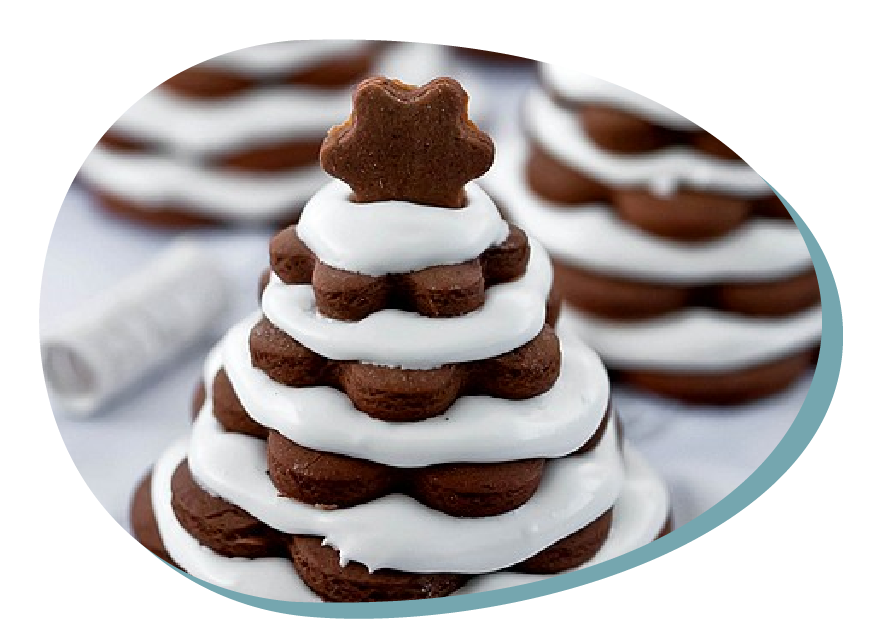Christmas trees from gingerbread
Type of resource: Websites
Web address https://www.mojewypieki.com/przepis/choinki-z-piernika
Language: English
Description
Constructing 3D models of Christmas tree with gingerbread cookies of differents geometrical shapes (triangles, squares, rectangles, cirles, stars etc).
Scientific concept introduced
Gram, decagram, kilogram, liter, milliliter, quarter-hour, gingerbread dough, baking, measuring, constructing
Creative and critical thinking
Creative thinking: imagination, constructing 3D models of Christmas trees, divergent thinking (decorating the gingerbread trees)
Mathematical reasoning
Precision and logic in operating with numbers (measuring and counting)
Scientific thinking
Predicting, observing
Learning how to learn
Motivation and engagement, self-efficacy
Additional
Teamwork – cooperating, taking common decision, sharing ideas and conclusions, sharing responsibility for the task; Language competences – using scientific concepts, taking part in a dialog; Following the rules of safety and discipline in a workplace.
Christmas trees from gingerbread
Overall aims
– Developing the ability to add and mix the ingredients;
– Developing the ability to use kitchen measures correctly (glass, spoon, teaspoon; gram, decagram, kilogram);
– Shaping the ability to measure time in kitchen (with cooking timer);
– Strengthening the constructive thinking and imagination;
– Supporting the observation skills;
– Developing fine motor skills;
– Building the ability to follow safety and hygienic rules.
Vocabulary – keywords should be understood
gram, decagram, kilogram, liter, milliliter, quarter-hour, gingerbread dough, baking, measuring, constructing
Expected learning outcomes (operational aims)
The children will be able to:
– to use mathematical measures correctly;
– to mix the ingredients;
– to measure the amount of ingredients given in the recipe;
– to measure the time of baking gingerbread cookies with a stopwatch;
– to follow the instruction given in the recipe;
– to follow the rule of safe and hygienic work in the kitchen environment.
STEM skills – to which the learning unit is related to
CORE STEM SKILLS
Mathematical thinking: precision and logic in operating with numbers (measuring and counting)
Creative thinking: imagination, constructing 3D models of Christmas trees, divergent thinking (decorating the gingerbread trees)
Scientific thinking: predicting, observing
Learning how to learn: motivation and engagement, self-efficacy
ADDITIONAL SKILLS
Teamwork – cooperating, taking common decision, sharing ideas and conclusions, sharing responsibility for the task
Language competences – using scientific concepts, taking part in a dialog
Following the rules of safety and discipline in a workplace
Teaching methodologies/activity outline
1. Introduction:
Reminding the units of measuring typically used in kitchen recipes (which will be needed for baking the gingerbread cookies). Presenting different ways of measuring the liquid and loose (powdery) ingredients. Playing with measuring and measuring equipment (coops, spoon, scales etc).
2. Preparing the gingerbread dough:
Preparing the workplace and all the necessary ingredients;
Measuring the ingredients according to the recipe, mixing and kneading the dough.
Wrapping the gingerbread dough into transparent kitchen foil, and putting it into the fridge for 2 hours to rest.
3. Playing with Dienes blocks – recognizing basic geometrical shapes
4. Constructing 3D models of Christmas tree from gingerbread cookies:
Flattening and rolling the dough into 4/5 mm pieces, using flour to protect the dough from sticking to the pastry board.
Cutting out different shapes from gingerbread dough (in small teams – each team cuts different shapes in a few different sizes e.g. triangles, circles, squares, stars, hexagons).
Putting cookies on the baking trays – prepared with paper.
Baking cookies in the oven preheated to 150 Celsius degrees for a quarter-hour. Measuring the baking time with stopwatch
After cooling down the cookies, children place the cookie in order – from the smallest to the largest. Teams construct the 3D models of Christmas trees using
toothpicks as the method of bonding the cookies.
Ready gingerbread trees can be decorated with icing glaze and food sprinkles.
5. Summarizing the activity
Children present their gingerbread trees – the cookies can be served and eaten in the classroom, wrapped for a gift for parents or packed into metal cans to preserve freshness.
Assessment of learning
Questions:
What did you like about this activity?
What was the most difficult?
Equipment and materials to be used in learning unit (tools, ingredients etc)
Equipment: baking board, large bowl, roller, blender, baking tray, knife, cookie cutters in different geometrical shapes and sizes
Measuring equipment – measuring scoops, kitchen scale, spoons, glasses, stopwatch, etc.
Ingredients: flour, eggs, butter, sugar, gingerbread seasoning, honey, baking soda, salt, cocoa, lemon juice.
Kind of setting
Kitchen and classroom
References – source
Christmas trees from gingerbread
1. Usefulness for STEM education – integrating content of different disciplines
Cross-curricular character of the resource

The range of S-T-E-M subjects included

The presentation of possibilities of including artistic activities (STEAM approach)

2. Expected learning outcomes
Consistency (links) with preschool core curriculum

Communicativeness of description

3. Methodology of teaching
Clarity, communicativeness of instructions for teachers

Meaningful learning – using practical life problems

Original idea

The level of ease in implementing the methodology to preschool age children

The level of ease in preparing necessary ingredients, materials and equipment needed

4. Sustainability
Ecological characteristics of materials/ results

Supporting healthy eating habits

Low ecological footprint

Possibilities of inclusion (respecting cultural diversity and food intolerances)

5. Class management
Using differentiated forms of work – individual, team work etc.

Individual work

Team work

Whole group
6. Time management

Short activity (10-15 minutes)

Medium activity (20-30 minutes)

Long activity (1 hour or more)

Very long activity (1 day or more)
PDF: https://www.printfriendly.com/p/g/zNf3nh

